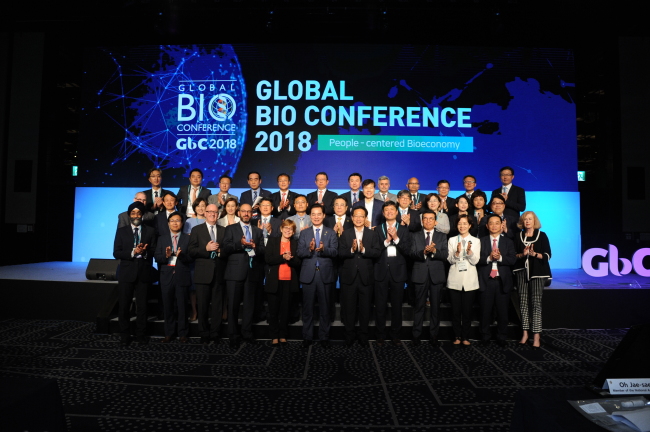Global conference for biotech industry kicks off in Seoul
Celltrion Chairman Seo Jung-jin highlights drugmaker’s success, vision in biosimilars development space
By Sohn Ji-youngPublished : June 27, 2018 - 17:18
The 2018 Global Bio Conference kicked off in Seoul on Wednesday, bringing together biotech regulators and industry experts from around the world to support the growth and overseas expansion of South Korea’s biopharmaceuticals businesses.
In its fourth edition, the GBC has invited 126 speakers from 32 countries and has drawn more than 3,000 participants including government officials, pharma industry experts and academics.
This year’s GBC, which continues through Friday, featured renowned speakers from the biotech industry and regulatory agencies to share insights on the latest industry trends and their areas of expertise.
In its fourth edition, the GBC has invited 126 speakers from 32 countries and has drawn more than 3,000 participants including government officials, pharma industry experts and academics.
This year’s GBC, which continues through Friday, featured renowned speakers from the biotech industry and regulatory agencies to share insights on the latest industry trends and their areas of expertise.

Representing Korea’s biopharma sector was Seo Jung-jin, the founding chairman of Celltrion, a global leader in biosimilars development. Founded as a venture in 2000, the company has grown into one of Korea’s largest exporters in the pharmaceuticals space.
In a keynote speech, Seo highlighted Celltrion’s successful development of monoclonal antibody biosimilars, and how the lower-cost copycat drugs have helped make expensive biologics more affordable for patients around the world.
Headquartered in Incheon’s Songdo, Celltrion specializes in biosimilars -- cheaper near-replicas of biologic drugs whose patents have expired. It was the first company to secure regulatory approval and commercialize a biosimilar referencing Remicade (infliximab) globally.
Remsima, Celltrion’s Remicade-based biosimilar, was commercialized in Europe in 2015. The lower-cost drug has since come to account for around 52 percent of the region’s infliximab market and drive down the original drug’s pricing by around 30 percent, Seo said.
The entry of the biosimilar also appears to have widened patient access to the drug, as the number of infliximab patients in the region has risen 15 percent since Remsima’s introduction, according to the chairman.
“It shows that even in developed countries in the EU, there are still patients who still cannot afford certain biologic drugs due to their high prices,” Seo said, citing the need for firms like Celltrion to continue to make medicine more affordable in a fast-aging world.
Celltrion’s Remicade biosimilar is also available in the US, where the product is marketed via Pfizer under the trade name Inflectra.
With aims for further market expansion, Celltrion is conducting phase 3 clinical trials for a subcutaneous version of Remsima that can be self-injected into the fatty tissue under the skin. It would offer more convenience than the original drug and Remsima, both of which are designed as intravascular injections
In addition, the Korean drugmaker currently sells Herceptin (trastuzumab) and Rituxan (rituximab) in Europe. The two biosimilars, Herzuma and Truxima, are expected to land in the US soon, as they await marketing approval by the US Food and Drug Administration.
Other speakers at the GBC included Chang Byung-gyu, chairman of Korea’s Presidential Committee on the Fourth Industrial Revolution, who highlighted the convergence of biotechnology and information technology as well as Korea’s efforts to forge a smart health care system backed by health care big data.
Mariangela Simao, assistant director-general at the World Health Organization, discussed efforts to improve global access to quality-assured medicines and vaccines. Wilson Bryan, director at the US Food and Drug Administration, discussed the latest in gene therapy development in the US and ways to speed up development procedures.
Additional special lectures touched on trending topics including the application of artificial intelligence and blockchain in the health care system, the impact of human data science on the biotech economy as well as successful open innovation and collaboration for new drug development.
The GBC will also be offering track-based forums for specific areas including vaccines, clinical trial statistics and combination biologics, as well as consultation meetings linking overseas drug regulator officials with local firms.
A workshop, jointly hosted by the WHO and the International Vaccine Institute, to discuss the development of a vaccine for the Middle East respiratory syndrome, is scheduled to take place Friday.
The Global Bio Conference is organized and hosted by the Korean Ministry of Food and Drug Safety and the Korea Biomedicine Industry Association.
By Sohn Ji-young (jys@heraldcorp.com)





![[From the Scene] Monks, Buddhists hail return of remains of Buddhas](http://res.heraldm.com/phpwas/restmb_idxmake.php?idx=644&simg=/content/image/2024/04/19/20240419050617_0.jpg&u=20240419175937)




![[Graphic News] French bulldog most popular breed in US, Maltese most popular in Korea](http://res.heraldm.com/phpwas/restmb_idxmake.php?idx=644&simg=/content/image/2024/04/18/20240418050864_0.gif&u=)



![[From the Scene] Monks, Buddhists hail return of remains of Buddhas](http://res.heraldm.com/phpwas/restmb_idxmake.php?idx=652&simg=/content/image/2024/04/19/20240419050617_0.jpg&u=20240419175937)

![[KH Explains] Hyundai's full hybrid edge to pay off amid slow transition to pure EVs](http://res.heraldm.com/phpwas/restmb_idxmake.php?idx=652&simg=/content/image/2024/04/18/20240418050645_0.jpg&u=20240419100350)

![[Today’s K-pop] Illit drops debut single remix](http://res.heraldm.com/phpwas/restmb_idxmake.php?idx=642&simg=/content/image/2024/04/19/20240419050612_0.jpg&u=)